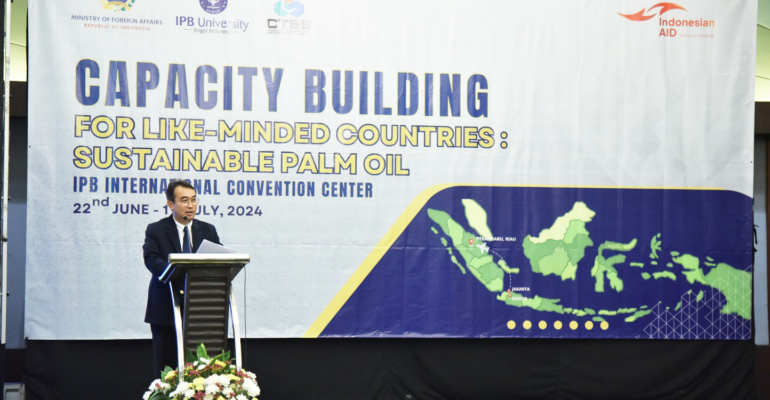IPB University Hosting Training on Sustainable Palm Commodity Grants

IPB University hosted the “Training on Sustainable Palm Oil Commodity Grants to Like-Minded Countries”. The event with the title Capacity Building “For Like – Minded Countries Sustainable Palm Oil” was held at the IPB International Convention Center on 22/6 to 1/7.
This collaboration between the Ministry of Foreign Affairs of the Republic of Indonesia, Center for Transdisciplinary and Sustainability Sciences (CTSS) IPB University, and Indonesian Agency for International Development (AID) was attended by delegates from 17 countries, including Argentina, Brazil, Bolivia, Colombia, Côte D’Ivoire, Dominican Republic, Ecuador, Ghana, Guatemala, Malaysia, Mexico, Nigeria, Papua New Guinea, Paraguay, Peru, St. Lucia, and Thailand.
Participants came from developing countries that produce palm oil and other important agricultural commodities such as coffee, cocoa, rubber, timber, soy, and beef. The training aimed to provide a broader perspective on smallholder agriculture across commodities.
Umar Hadi, Director General of the Americas and Europe, The Ministry of Foreign Affairs of the Republic of Indonesia, said that this activity is important because among palm oil producing countries, Indonesia faces the same challenge, namely the existence of trade restriction patterns in several palm oil importers for various reasons such as sustainability and deforestation issues.
“The exchange of experiences and practices is needed to ensure that palm oil commodities can survive in the current global market era. In addition, the welfare of smallholders is very dependent on the commodities they produce so it is important to achieve a world free of poverty and hunger, as mandated by the achievement of the Sustainable Development Goals (SDGs),” he concluded.
Umar continued, this activity is an effort of the Indonesian government in order to share experiences and knowledge with countries from various palm commodity regions so that many countries will produce palm oil using the principle of sustainability.
Meanwhile, Vice Rector of IPB University for Research, Innovation, and Agromaritime Development, Prof Ernan Rustiadi added that IPB University has been actively involved in strengthening relationships with farmers and local stakeholders, as well as contributing to the sustainability achievements of the palm oil sector.
“This training is also expected to increase Indonesia’s cooperation with Global South countries, through collaboration, research, and education,” Prof Ernan said.
He continued, Indonesia’s training grants to peer countries were given as a form of solidarity with countries that have similar challenges. In addition to sharing best practices and lessons-learned, this training is expected to formulate the aspirations of commodity-producing countries that deserve to be heard by the global community. (IAAS/SNI)



